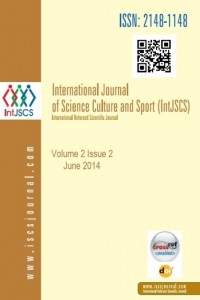Öz
Meaningful capacity building should essentially include promotion and maintenance of health of workers. The nature of office responsibilities, if care is not taken easily predisposes workers to sedentary, aetiology of heart diseases capable of promoting social, physical and mental health problems with adverse consequences on workers’ productivity. The study focused complementary role of recreation in capacity building among state civil servants of Oyo State in order to enhance, sustain and maintain their health. 2800 participants involving males and females drawn from 20 Ministries on equal basis, through randomization were used for the study. Self-developed questionnaire, validated for construct and content assurance were employed to collect data which were analysed with chi-square (X2) inferential statistics at 0.05 alpha level. Based on the conclusions, recommendations were proffered on strategies to promote recreation among workers with the provision of recreational facilities at secretariats as well as introduction of mandatory monthly ‘walk for fitness’ by every rank and file of workers under the leadership of recreation experts.
Anahtar Kelimeler
Kaynakça
- Akinloye, A.O. (2011). Health-Related Dividends of Physical Fitness Exercise among the Elites. In: P.B. Ikulayo (Ed).
- Akintunde, P.G. (2001). Administration and Organisation of physical and health education, Sports and recreation. Ibadan: Yew Printer. 207-224.
- Azubuike, C.U. (2011). Overweight, Obesity, Health Risk and Management. In P.B. Ikulayo (Ed.) A book of reading in Fitness and Health, Lagos: Department of Human Kinetics and Health Education, University of Lagos 211-228.
- Babatunde, S.O. (2004). Recreation: A veritable tool for achieving community integration in Nigeria. Journal of the Nigeria Association of Physical Health Education. Recreation, Sports and Dance (OYO-JONAPHER.SD). Ibadan. Department of Human Kinetics and Health Education 2(4).
- Babatunde, S.O. and Ogundipe F. (2006). Enhancing Quality of life through recreation. Journal of International council for Health, Physical Education, Recreation, Sports and Dance “ICHPER-SD African Region. Ibadan 1(2), 146-151.
- Babatunde, S.O. (2007). Socio-demographic variables of sports participation among female Teaching Staff of Secondary Schools in Akinyele Local Government Area, Oyo State, Nigeria. West African Journal of Physical and Health Education, Ibadan: Department of Human Kinetics and Health Education, University of Ibadan, Nigeria 11, 108-117.
- Babatunde, S.O. (2011). Dieting and Weight Maintenance. In: P.B. Ikulayo (Ed). A book of Reading in fitness and Health, Lagos: Department of Human Kinetics and Health Education, University of Lagos 70-80.
- Babatunde, S.O. (2012). Extrinsic Strategies for Promoting Sports among Undergraduates Students in Nigerian Universities. Journal of Pedagogical Thought. Tanzania. Kampala International University College 7, 1-9.
- Haastrup, E.A. (2011). Incorperating Fitness into a Daily Busy Lifestyle: A challenge for All. In P.B. Ikulayo (Ed). A book of reading in Fitness and Health, Lagos: Department of Human Kinetics and Health Education, University of Lagos 47-55.
- Moronkola, and Abass, (2001). Using Leisure-time activities to promote health and peace in educational institution. In Udoh, C.O. (Ed). Issues in Human Kinetics, Health Promotion and Education: A book of readings in Honour of Professor J.A. Adedeji. Ibadan: Chris-Rose Ventures 124-129.
- Nwankwo, E.I. (1990). The body and Exercise Equation Towards making Every Nigerian a winner. Faculty of Education. University of Ibadan: Faculty Lecture Series No. 6.
- Omolawon, K.O. (2000). Recreational Activities as a Means of Improving Healthful living. African Journal of Cross-Cultural Psychology and Sport Facilitation 4, 31-33.
- Oyo State Government Diary (2013).
Öz
Kaynakça
- Akinloye, A.O. (2011). Health-Related Dividends of Physical Fitness Exercise among the Elites. In: P.B. Ikulayo (Ed).
- Akintunde, P.G. (2001). Administration and Organisation of physical and health education, Sports and recreation. Ibadan: Yew Printer. 207-224.
- Azubuike, C.U. (2011). Overweight, Obesity, Health Risk and Management. In P.B. Ikulayo (Ed.) A book of reading in Fitness and Health, Lagos: Department of Human Kinetics and Health Education, University of Lagos 211-228.
- Babatunde, S.O. (2004). Recreation: A veritable tool for achieving community integration in Nigeria. Journal of the Nigeria Association of Physical Health Education. Recreation, Sports and Dance (OYO-JONAPHER.SD). Ibadan. Department of Human Kinetics and Health Education 2(4).
- Babatunde, S.O. and Ogundipe F. (2006). Enhancing Quality of life through recreation. Journal of International council for Health, Physical Education, Recreation, Sports and Dance “ICHPER-SD African Region. Ibadan 1(2), 146-151.
- Babatunde, S.O. (2007). Socio-demographic variables of sports participation among female Teaching Staff of Secondary Schools in Akinyele Local Government Area, Oyo State, Nigeria. West African Journal of Physical and Health Education, Ibadan: Department of Human Kinetics and Health Education, University of Ibadan, Nigeria 11, 108-117.
- Babatunde, S.O. (2011). Dieting and Weight Maintenance. In: P.B. Ikulayo (Ed). A book of Reading in fitness and Health, Lagos: Department of Human Kinetics and Health Education, University of Lagos 70-80.
- Babatunde, S.O. (2012). Extrinsic Strategies for Promoting Sports among Undergraduates Students in Nigerian Universities. Journal of Pedagogical Thought. Tanzania. Kampala International University College 7, 1-9.
- Haastrup, E.A. (2011). Incorperating Fitness into a Daily Busy Lifestyle: A challenge for All. In P.B. Ikulayo (Ed). A book of reading in Fitness and Health, Lagos: Department of Human Kinetics and Health Education, University of Lagos 47-55.
- Moronkola, and Abass, (2001). Using Leisure-time activities to promote health and peace in educational institution. In Udoh, C.O. (Ed). Issues in Human Kinetics, Health Promotion and Education: A book of readings in Honour of Professor J.A. Adedeji. Ibadan: Chris-Rose Ventures 124-129.
- Nwankwo, E.I. (1990). The body and Exercise Equation Towards making Every Nigerian a winner. Faculty of Education. University of Ibadan: Faculty Lecture Series No. 6.
- Omolawon, K.O. (2000). Recreational Activities as a Means of Improving Healthful living. African Journal of Cross-Cultural Psychology and Sport Facilitation 4, 31-33.
- Oyo State Government Diary (2013).
Ayrıntılar
| Birincil Dil | En |
|---|---|
| Bölüm | Makaleler |
| Yazarlar | |
| Yayımlanma Tarihi | 3 Şubat 2015 |
| Yayımlandığı Sayı | Yıl 2014 Cilt 2 - Sayı 2 |


